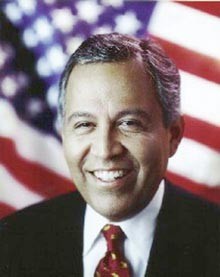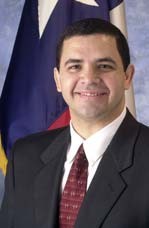From both sides, enormous political forces have been dispatched to Texas to flex some party muscle. In Henry Bonilla's corner: political insider Karen Hughes and George Bush, who has made numerous trips to the area to stump for the Republican incumbent. For Henry Cuellar, the Democratic challenger: House Democratic Leader Dick Gephardt and Clintonite pundit James Carville, plus a few others.
| Henry Bonilla |
Both men, by Washington's loose standards, are capable leaders. Bonilla, a former broadcast journalist, is a two-term U.S. representative who co-chaired the 2000 Republican National Convention. Cuellar, a lawyer and former Texas Secretary of State (hand-picked by Rick Perry after the 2000 election), is a well-connected state representative and self-described "bipartisan" in a heavily-partisan state.
Bonilla is patently conservative: He is staunchly anti-abortion, but has no problem executing former fetuses who commit serious crimes (or building more prisons to house those less-serious offenders - such as pot-smoking cancer patients and flag-burners). Cuellar, for his part, carefully toes a centrist Democratic party line, campaigning on a platform of education and economic growth - and speaks like a man who has spent years on the Hill. He talks of "seducing" voters with his past record, which is admittedly substantial: In 14 years as a state representative, Cuellar sponsored early implementation of the Children's Health Insurance Program (CHIP), and secured some large grants for UTSA.
| Henry Cuellar |
But put these two men in a dark room and they'd be hard to tell apart. Both are career politicians with ties to big money (see chart, next page) - though Cuellar's contributors are far more palatable. Both give lip service to bipartisanship (which in recent times has come to mean "agreeing with the Bush administration"), and both hope to reap the harvest (in votes) of a largely Latino constituency. In real terms, this race has come down to two Henrys throwing huge amounts of money at a poor border district and trying to "out-Hispanic" each other for one of the most powerful positions in the country.
So what does the Current's Magic 8-ball predict for District 23? Both men are running slick campaigns, and voter turnout has become an important issue in this race. San Antonio's Northwest side has been all but zipped up by the Republicans. (Jason Burke, Cuellar's campaign manager, has said that, "We want to get murdered `in San Antonio`, but not massacred.") But Laredo - with fewer voters, but more Democrats - could provide the edge Cuellar needs in this race. Our forecast? Six more years of Bonilla fudge.
And now for something completely different: a Green contender
The road into Grey Forest tells the entire story. A full-size billboard plastered with the image of Henry Bonilla smiles out at commuters leaving San Antonio, and Cuellar's campaign signs are posted in yards around Helotes. Not until one arrives at a small hogwire gate on a scenic country road does the name of District 23's Green Party candidate appear (the Libertarians are running Jeffrey Blunt, who opposed Lamar Smith in 1998 in District 21). Even then, "Scharf Realty" hardly smacks of a campaign headquarters.
With a war chest of just $300 ("She won't let me spend any more," Ed Scharf jokes, indicating his wife), Scharf is running a campaign of ideas. That may not mean much in today's climate of multi-million-dollar politics, but Scharf's platform - which includes campaign finance reform, a freeze on pork barrel projects (including the PGA village and a new CPS substation in Fair Oaks), and renewed implementation of promised health care for veterans - has proven infectious. Both his wife, Irene, and son, Darren, have not only adopted the Green Party, but are candidates themselves. (Irene is running for the State Board of Education, Darren for state rep.)
Two years ago, while encouraging his son's involvement in Nader's presidential campaign, Scharf had an epiphany. He abandoned his post as Republican precinct chair and caucus representative; a move precipitated, he says, by countless arguments with his wife, a former activist for the Democratic party. "We used to sit around the table and argue about which party was more corrupt," he says with a grin.
A soft-spoken man, Scharf is nonetheless vociferous in his condemnation of the two-party system. "I'm basically saying there's too much corruption," he says, "When they take a million dollars and say, 'We're representing you'' it's an outright lie."
It is unlikely that Scharf will be your next congressman, but here's one sure thing: The air is a lot cleaner in Grey Forest this October than it is on Capitol Hill.



